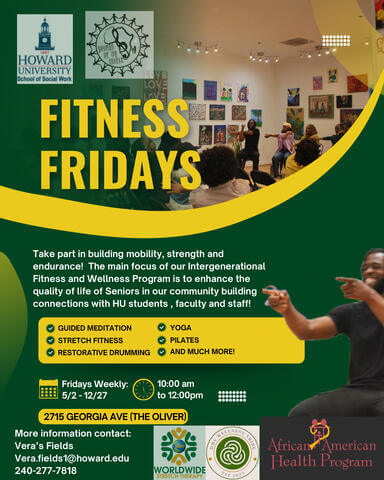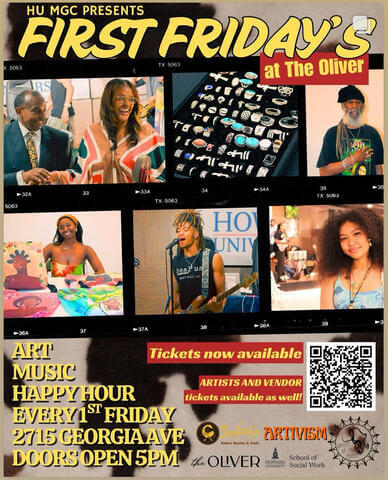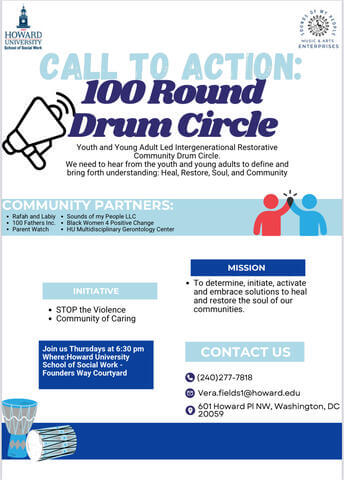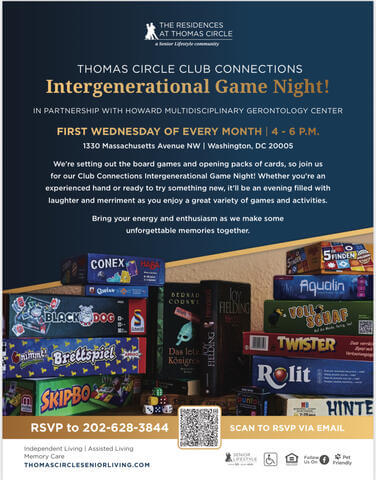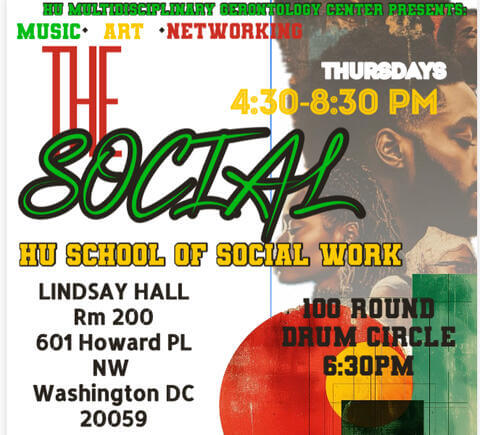Multidisciplinary Gerontology Center
The Howard University Multidisciplinary Gerontology Center (HU-MGC) was established in 1992 (circa) under the leadership of former dean and provost, Dr. Richard A. English. Originally funded with a grant from the U.S. Department of Health and Human Services. The Multidisciplinary Gerontology Center's mission is to serve as a knowledge base and program resource to promote the effective transfer, dissemination, and utilization of information; providing programing, information, consultation, and other forms of assistance to community stakeholders, the public, the aging network, voluntary and other public and private sector organizations and businesses.
Read More
The podcast, Grand Stories: Profiles in Aging, developed by Dr. Robert Cosby, center director, addresses emerging social justice issues, aging issues, and social work collaborations. HU-MGC collaborates with community stakeholders, government agencies and both for profit and non-profit entities to provide resources and programing to the Greater Washington, D.C. and surrounding communities. These programs identify and aid Seniors and their families impacted by Social Isolation and other Grand Challenges.
HU-MGC Collaborations/Programs
- Plaza West GrandFamilies Community Program : Grand parents raising grand Children : In collaboration with Mission First Housing Program, HU-MGC provides a monthly support group for grand parents
- Community Outreach Programming- Intergenerational supports including conferences, programs, classes, and events in collaboration with Sounds of my People Music and Arts Enterprises, Montgomery County Department of Parks and Recreation, the Montgomery County African American Health Program (AAHP) Aging Sub-Committee, 100 Father's Inc., HU Center for Excellence, the Department for Aging and Community Living (DACL) and the American Minority Veterans Research Project.
The Grand Challenges of Social Work, Inc. have identified fourteen Grand Challenges affecting communities across the United States. Some areas of Gerontology Center collaboration include helping older adults become more engaged with Community. Such community engagement includes prevention and healing activities needed in communities affected by the opioid epidemic, gun violence and young adult’s lack of workforce development skills needed to access jobs. Such employment opportunities can help the individual, family and community in economic, social and cultural ways that promote productive citizens.
The HU-MGC is housed within the library/Multipurpose Room 200A of Howard University's School of Social Work.
Dr. Robert Cosby- HU-MGC Director
Vera Fields- Community Outreach Coordinator
Areas of Concentration
- Technological/Social Media Training & Guiding : Exploring use of social media as intervention & marketing, documenting historical life experiences
- Social Isolation Prevention - Help seniors and younger persons identify and help prevent loneliness, social isolation and disengagement
- Cultural Competence/Intelligence: Understanding Epigenetics and Gene Expression and the role Trauma can play over generations, Focus on diversity of aging population with specific emphasis on vulnerable groups
- Substance Use and Psychopharmacology: Understanding treatment approaches and new interventions, Education about Opioid Use and the Impact on Family and Community
- Mental Health- Self care and supports Theme: Knowledge related to importance of forgiveness to well being
- Financial Wellness: Provide information on housing choices, retirement communities, building, protecting and sustaining opportunity and generational wealth
- Community Outreach Intervention: Gun Violence Prevention and Education, Intergenerational Programming and Youth Mentorship
- Promoting and Building African American Health and Well Being: Ethics and Alzheimer's Disease-Person-Centered Care: Application of a Human Center Design and factoring in the ethical principles of the procedural functionality of the design in relation to Alzheimer's Disease and Dementia, Disseminating Information on the Leading Causes of Morbidity and Mortality
Howard University Multidisciplinary Gerontology Center (MGC) has professional partnerships with community organizations for over 20 years . Present partnerships include the DC Department on Aging and Community Living (DACL), BlackDoctors.org, Mission First Housing, Montgomery County Department of Health and Human Services, African American Health Program- Aging Sub- Committee, Sounds of My People Music and Arts Enterprises, The Residence of Thomas Circle and 100 Fathers Inc. Collectively, these collaborations have provided over 100 professional development opportunities, conferences, and community events that address issues regarding the elderly population in the community.
The HU MGC provides seminars and workshops for professional and paraprofessional staff of the District of Columbia's Department on Aging and Community Living Senior Service Network, social work and other professional students; and the general community serving older adults and persons with disabilities in the greater metropolitan Washington community.
Community Outreach programs and initiatives for the 2025-2026 school year include Youth & Young Adult- led intergenerational Restorative Drum Circles, Youth Leadership and Workforce Development Internship Program, and Research Based Multigenerational Outreach program designed to Strengthen Community by decreasing Social Isolation in 65+, strengthening intergenerational bonds, provide mentorship to Youth, teach restorative practices and social emotional learning (SEL).
The HU MGC holds community monthly events to support our initiative to decrease social isolation among seniors aging in place, to increase intergenerational interaction between HU students, faculty and staff and the surrounding community, and to build and restore community cohesion. To find out more about our outreach programs, internships and other related initiatives, please contact Ms. Vera Fields, MGC Community Outreach Coordinator (vera.fields@howard.edu).
The HU MGC's research initiatives encompass undergraduate and graduate collaborations. The HU MGC has five primary areas of investigation, orchestrated by Dr. Robert Cosby, HU MGC Director:
- Social isolation & older adults
- Grandparents raising grandchildren
- Adverse childhood experiences, trauma, and older adults
- Gun violence's impact on intergenerational relationships
- Gentrification and generational wealth
Dr. Robert Cosby developed Grand Stories: Profiles in Aging, https://podcasters.spotify.com/pod/show/grandstories ) a podcast to help address emerging social justice issues, aging issues, and social work collaborations.
HU Multidisciplinary Gerontology Center is in partnership with several community stakeholders (Sounds of My People Music and Arts Enterprises, American Minority Veterans Research (AMVRP) Inc., 100 Fathers Inc., selected Prince George’s County Public Schools, Washington DC and Montgomery County High Schools, (Reserve Officers Training Corps (ROTC) Programs - Social and Emotional Learning (SEL) and or Parent - Teacher Student Associations (PTSAs).
The Grand Challenges of Social Work have identified fourteen Grand Challenges affecting communities across the United States.
Some areas of Gerontology Center collaboration include helping older adults become more engaged with social services to youth to combat the issues in our society/communities. Such community engagement included prevention and healing activities needed in communities affected by the opioid epidemic, gun violence and young adult’s lack of workforce development skills needed to access jobs. Such employment opportunities can help the individual, family and community in economic, social and cultural ways that promote productive citizens.
One of the HU Multidisciplinary Gerontology Center's goals is to help Create Stronger Social Fabric in communities. This can be done by adopting four of the Grand Challenges goals by helping to:
Adopt the following four Grand Challenges of Social Work Addressed /Program goals:
1). Social Isolation: promote resilience, social inclusion, independence, and overall community well-being for older Marylanders: Restoring Elders 64 + function in community as wise mentors, Eradicate Social Isolation- social isolation and loneliness are associated with poor physical and mental health outcomes among youth transitioning to adulthood (Office of the Surgeon General, 2023; Sapiro & Ward, 2020).
2). Gun Violence: Work to Prevent Gun Violence in communities. Youth training to be peer mentors: SEL and Restorative Practices, recognize your voice and use it in a more productive way, restoring function of youth in communities as future leaders involving seniors as mentors
3). Social Response to a changing Environment- thru collaborations with community partners (Grand Stories and Veterans Research will be developed and used in the Restorative Practice training sessions) and will Train youth how to work with and communicate with elders 65+
4). Harness Technology for Social Good -youth will share their technology skills- help to work with older adults to develop memory trees, family blogs and create interactive Website, including Blogs, interactive history, exploring family tree, etc.- Gerontology Center, Grand Stories, etc.
- First Fridays with Artivism ~ Every first Friday starting at 6pm at the Oliver. (2715 Georgia Ave NW)
- Fitness Fridays at the Oliver ~ Every Friday from 10am~12pm at the Oliver. (2715 Georgia Ave NW)
- Intergenerational Game Nights ~ Every first Wednesday from 4pm~6pm at The Residences at Thomas Circle. (1330 Massachusetts Ave NW)
- Senior Socials ~ TBD
- HU Homecoming — Senior Alumni Events ~ TBD
Multidisciplinary Gerontology Center Newsletter brings awareness to issues affecting older adults from first person accounts, to services and supports, health and wellness issues, to current and pressing issues of concern among the aging adult population.
Click the links below to access archived editions of the newsletter.
Contact
Inabel Lindsay Hall, Bldg, #53 School of Social Work, Room 220
601 Howard Place, NW Washington, DC 20059
Dr. Robert Cosby
Director of the Multidisciplinary Gerontology Center
robert.cosby@howard.edu
202-806-4739
Fax: 202-387-4309
Vera Fields
Outreach Program Coordinator
vera.fields1@howard.edu
240-277-7818
Fax: 202-387-4309

